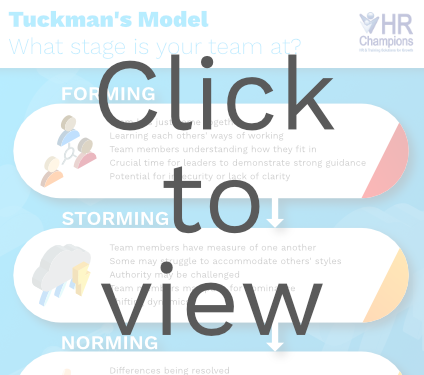Super User
HR cases in the news - Overtime for extra hours
Retailers whose staff work extra hours to open and close a store should ensure their employees are adequately remunerated for such duties after a tribunal ruled that as the claimant, Mr Fitz, was employed on a fixed hours’ contract, it was implied that that he– and any other employee with fixed hours – would be paid for any overtime they carried out.
In this case, the supervisor was required to cover for the store manager if they were absent, which required opening and closing the store, among other tasks that needed to be completed during opening hours.
He claimed he had clocked up over 200 hours in overtime, after his contracted shifts were due to finish, for which he was not paid.
Holland & Barrett was ordered to pay the employee £1,019.75 in compensation for the overtime worked.
Action: Review any non-autonomous employees covering managerial roles and pay for additional hours.
What Stage is Your Team At?
 It’s probably a fair assumption that most of the projects or tasks undertaken in the workplace are worked on by teams; ie a number of different people, each assigned with his or her own responsibilities in order to achieve a common goal. Even the most fundamental of projects can require a team of as few as two people with very different tasks to get a job done. Think; one to paint the wall and one to hold the ladder.
It’s probably a fair assumption that most of the projects or tasks undertaken in the workplace are worked on by teams; ie a number of different people, each assigned with his or her own responsibilities in order to achieve a common goal. Even the most fundamental of projects can require a team of as few as two people with very different tasks to get a job done. Think; one to paint the wall and one to hold the ladder.
Amongst teams, there will be a range of different skills, abilities, personalities and ways of working that can create challenges that need to be overcome. In the 1960’s, psychologist Bruce Tuckman characterised the process that teams go through when reaching a productive state with the phrase "forming, storming, norming, and performing" in his article, "Developmental Sequence in Small Groups." He later added a fifth stage of “adjourning”.
It is very easy to apply Tuckman’s Model to a team that you work in or manage to understand where in the journey that team has been and is now. Here’s a brief description of each stage:
Forming: The team has just come together, and people are polite if perhaps a little reserved with one another as they learn and understand others’ job roles, ways of working and personalities. Individuals will be looking at how they and others fit in the team and some anxiety my bubble to the surface due to insecurity or lack of clarity. This is a crucial time for leaders to demonstrate strong guidance.
Storming: Team members have the measure of one another now and there may be conflict as some push for supremacy or dominance. Some may struggle to accommodate other members’ working styles and processes, which can create frustration. As a leader you may find your authority challenged, particularly if ground rules haven’t been set or if there is a lack of established processes. Storming can also occur when a new member joins a stable team as the dynamic shifts and members once again must establish themselves and their positions.
Norming: As team members resolve their differences, understand their own and colleagues’ roles, and the chain of command is established, we move to a position where we see some real progress towards the team’s goals. Members will start to rely on one another and feel able to ask for help from one another. They may even begin to socialise and form friendships. The norming stage can take a while to establish as new tasks or team members send the team back to storming.
Performing: Eventually we should get to a stage where the team is achieving what it was set up to do and manages this without conflict or resistance. A sign that the team has reached this stage is when it continues to function in the absence of its leader. A performing team should be able to continue effectively even if team members come and go.
Adjourning: This stage can occur if the team was set up to complete a specific task which it achieves and is subsequently disbanded, or if a restructure breaks the team apart. This can be a difficult stage for some people, especially when strong friendships have been formed, which is why it is sometimes referred to as “mourning”.
Recognising what stage your team is at will make your management of it more effective as you can implement tactics to progress to the performing stage more quickly. We discuss Tuckman’s model in more detail in our Level 2 Team Member and Team Leader courses which you can attend for free, along with other courses, if your business is in Worcestershire, Swindon & Wiltshire or Bristol & the West of England LEP areas. Call us on 01452 331331 or e-mail This email address is being protected from spambots. You need JavaScript enabled to view it. for more details.
Discrimination Law Starts at Recruitment
It’s worth remembering that individuals don’t have to have attained employee status before they can be discriminated against and therefore enter a claim. The Equalities Act applies from the outset of the recruitment process so a claim can occur if a job advert or the recruitment process is felt by the applicant to be discriminatory.
It’s unlikely that we’ll be deliberately discriminatory when recruiting new employees, but we should remain vigilant of our own actions and processes in case something that we think is innocent could be interpreted otherwise. Using phrases that describe positions as suiting either a young or a mature person instantly crosses the line. Specifying too that you are looking for someone of a particular gender, unless there is a cast-iron reason to do so, is an absolute no-no.
During the selection process, scoring systems are usually a good method for shortlisting applicants for interview. Depending upon the vacancy, you could award scores for relevant qualifications, experience in similar roles and/or business sector, career continuity and IT skills. Make sure that any scoring system you use is applied consistently and fairly to all applicants. Hold on to your results for six months as evidence that a fair process was followed.
Be aware of any potential for Unconscious Bias. Some organisations will omit delegates’ names from their application scoring systems so that their ethnic origin or gender cannot be guessed or assumed by those doing the scoring; thereby avoiding any adverse scoring being applied due to the scorer’s underlying prejudices.
For example. a female applying for a job as a heating engineer may be unconsciously marked down because it is a job normally associated with men, even though she may be the most highly qualified and suitable applicant.
At interview be conscious of the questions you ask. Health and disability issues do not have to be declared until after a job offer has been made and accepted unless the issue relates intrinsically to the role.
Asking a female applicant if she plans to have children in the future is blatant sexual discrimination, but now that there is Shared Parental Leave, asking the same of a male applicant could also get you into hot water.
Ultimately, you should always aim to employ the best person for the job regardless of any other factors. How they fit in with your team is likely to be an important factor so personality and how they come across at interview will potentially have as much bearing as skills and experience. To avoid tribunal claims however make sure that if asked, you can prove that a fair selection process was used.
Join us at our recruitment seminar on 22nd May for support and guidance on making your recruitment process as effective as possible. Call us on 01452 331331, e-mail This email address is being protected from spambots. You need JavaScript enabled to view it. or book online.
Mental Health Awareness Training
Employers have a legal duty of care to provide a safe working environment for employees. Moreover, employers have a moral duty to support employees' mental and emotional wellbeing. UK government statistics show that poor mental health costs businesses £34.6 billion annually. Increasing awareness of mental health can de-stigmatise the conversation and build a culture in which employees can thrive.
This is a 4-hour session to raise awareness of wellbeing and mental health, and for delegates to learn how to recognise and look after their own mental health.
What you’ll learn:
- Mental Health and Wellbeing
- The Mental Health Continuum
- Stigma and myth around Mental Health
- Stress, anxiety and depression
- Overview of other Mental Health conditions
- Early warning signs and where to go for support
- Wellbeing plan
Price:
1/2 day training for up to 12 delegates - £1000 (+ VAT).
| Benefits to the Business | Benefits to the Delegate |
| Support the company’s well-being agenda | Be confident in supporting colleagues and knowing where to sign post them |
| Create an agile workforce who can recognise the early signs of poor mental health | Have an appreciation for mental health conditions |
| Build an inclusive culture where employees work to their full potential | Feel comfortable to be honest about your absence and seeking help |
| Reduce unexplained absences and manage long-term sickness effectively | Know how to take care of your own mental health and wellbeing as well as others’ |
Get in touch to find out more.
Mental Health First Aider Training: One-day
One-Day Course on First Aid for Mental Health
To enquire about new dates please email: Training@hrchampions.co.uk
Course Overview
This one-day course equips employers and employees with the knowledge and skills to understand mental health conditions, promote well-being in the workplace, and provide initial support. Mental Health First Aiders (MHFAs) play a crucial role in fostering a supportive environment, identifying early signs of mental health issues, and guiding individuals towards appropriate professional help. Employers have a legal duty to ensure their workplace is a safe and supportive space, and Mental Health First Aiders are an essential part of fulfilling this responsibility. This course builds the foundation to meet these standards, emphasising the importance of mental health in the workplace.
What You’ll Learn
By the end of the course, you will:
- Understand what First Aid for Mental Health is and its importance in the workplace
- Learn to identify mental health conditions, including stress and anxiety
- Develop the skills to start conversations and provide advice confidentially
- Understand how to address mental health conditions related to stress, drugs, and alcohol
- Implement the First Aid for Mental Health action plan effectively.
Course Syllabus
The course covers key topics, including:
- What is First Aid for Mental Health?
- Identifying mental health conditions and early warning signs.
- Providing advice and starting a conversation.
- Understanding stress and its impact on mental health.
- Mental health conditions related to drugs and alcohol.
- Creating and applying a First Aid for Mental Health action plan.
- Implementing First Aid for Mental Health in the workplace.
Course Details
Duration: 1 day. 9.00am to 4.00pm
Assessment: Practical exercises, open-ended questions, and multiple-choice assessments.
Certification: Upon successful completion, participants will earn:
- FAA Level 2 Award in First Aid for Mental Health (RQF) or
- Award in First Aid for Mental Health at SCQF Level 5.
These certifications are valid for three years. Annual refresher training is recommended, and participants must retake the full course to requalify after three years.
To book onto this course, please email training@hrchampions.co.uk
| Benefits to the Business | Benefits to the Delegate |
| Build a team of listeners who can signpost colleagues to the right support | Recognise poor mental health signs in colleagues |
| Pay now, save later: poor mental health costs UK businesses £1,300 per employee | Feel confident in holding conversations with vulnerable colleagues in the workplace |
| Reduce unexplained staff absences | Know the appropriate support services available internally and externally |
| Avoid long-term sickness by recognising the signs of poor mental health in colleagues early | Contribute to the company’s well-being culture |
Mental Health and the working environment – part 2
We can probably all agree that we spend a LOT of our time at work. Our own work space can often feel like an area where we’re not in control. Given the impact that our physical environment can have on our mental health, it’s easy to see how a disorderly workspace can lead to increased stress or exacerbate other underlying mental health issues.
Whether it’s an untidy desk space, poor lighting, noisy colleagues, or even topics of conversation within the office that make you feel uncomfortable, unwelcome elements in a workplace can sometimes be difficult to overcome, no matter how minor they may seem. It all adds up – and can make or break the enjoyment of being in the working environment.
However, that doesn’t mean that everything is out of your control. Here, we’ve come up with a few tips to help you regain control of your working environment and ensure that those little niggles don’t become the final straw of an already stressful day.
Here's part 2 of our guide to improving your working environment.
Time away from desk
Ensuring you actually have a little break from your desk really does make a huge difference. And the irony here is that the reason people often don’t do this is because they’re ‘too busy’! It’s likely that these are the individuals who will benefit the most from stepping away for 10 minutes to have some breathing space. So, make sure you take a break when things are getting too much; you’ll often find you’re in a much better place afterwards.
Conversation topics
There are times when the topics of conversation in the office can be the cause of discomfort – whether it’s because somebody’s talking about something that hits close to home, or just something you’re uncomfortable discussing in a workplace. This can be a tricky situation to deal with without causing unnecessary friction. Excusing yourself from the conversation is often easier said than done, and asking people to change topic can come across confrontational. Depending on your relationship with your colleagues, most people won’t mind discussing something else if you say you’re uncomfortable, so don’t be afraid to ask, especially if you feel it’s having a detrimental effect on your mood.
Food & drink
Does your workplace have a ‘bring cakes on your birthday’ rule? The constant stream of cakes in the office can be great, but it can also have a negative impact on mood. It could be that you’re trying to watch your weight so the constant influx in sweet treats just adds more pressure. It could be that you’re happy to have the occasional cake, but the sugars in treats have a negative effect on your mood.
So, what can you do about it? This can be a tricky on to deal with, as it involves getting agreement from everybody in your workspace on how to move forward. But putting forward suggestions of limiting office cakes to perhaps once a month (regardless of birthdays!), or to swap cakes for healthier snacks, and not necessarily fruit which can also be high in sugar, can have a positive impact on everybody’s mental and physical health.
Dogs at work
This is Betty. She’s in our office 99% of the time, and is always open to cuddles, treats, and walks. She’s can be an absolute godsend on a stressful day.
There’s plenty of research to show that dogs in the workplace have a positive impact, on both mental and physical health. If a regular dog in the office isn’t feasible, then you could suggest a ‘Bring Your Dog to Work Day’ or similar.
Obviously make sure that you check everybody in the office is okay with dogs, and that if multiple people are bringing a dog in on the same day that they’re happy to socialise with other dogs.
So, there we have it – a few simple ways to help ensure your working environment isn’t having a detrimental effect on your mental health. Remember, if things are getting too much for you, whether in the workplace or otherwise, it’s always better to talk through potential problems before they become too big. Speak to somebody you trust – a friend, family member, or colleague; and if your workplace has them, a Mental Health First Aider. We have training courses for this.
Mental Health Seminar - 20 March 2019
Having held our Mental Health Seminar last week, it’s clear that employers’ responsibilities regarding the mental wellbeing of their employees is an issue that will continue to be at the forefront of HR and Employment Law for some time to come. Already a concern for many businesses, the view of speakers during the seminar was that more preparation is needed to prevent poor mental health escalating into a significant risk for employers. There is plenty we can do however.
Following a presentation from Abbie Warren of the day’s nominated charity, Sunshine Suicide Support, delegates heard from a variety of presenters who covered a wide range of topics associated with mental health and wellbeing in the workplace. As you might expect, presentations were sprinkled with various facts and figures, some of which were quite shocking and brought the scale of the mental health issue in the UK to the fore.
Statistics shared included:
- In the last 6 years the number of working days in the UK lost to stress, depression and anxiety has increased by 24% and now stands at over 15 million - Mental Health Foundation
- Mental health problems at work cost employers £33bn-£42bn - Centre for Mental Health 2018
- And the total impact on the UK economy ranges between £74 and £99 billion - UK Govt. Thriving at Work 2017
- 33% of employees have been diagnosed with a mental health issue - Mental Health at Work 2018 Report
- And 1 in 5 people take a day off work due to stress - Mental Health Foundation
- 10% of managers reported sick for stress & Mental health issues during 2018 - CMI, 2018
From a legal perspective, delegates heard from Anne-Marie Boyle, partner at Menzies Law – Specialist Employment Lawyers, who clearly set out the legal viewpoint around mental health and disability in general.
As mental health conditions can be classed as disability, Anne-Marie’s presentation covered definitions of disability and impairment and went on to explain the types of claim that could arise from somebody with a disability. Apart from the obvious unfavourable treatment from an employer, bullying, harassment and victimisation from colleagues were also highlighted as risk areas that remain the responsibility of the employer.
After lunch, presenters from HR Champions took the floor, tackling the subject of managing mental health conditions in the workplace. Whilst we looked at the practical aspects of managing absence and making reasonable adjustments, we also discussed employee wellbeing in general and how to spot the signs of and deal with potential mental health issues before they got out of hand.
We finished the afternoon session studying a range of case studies to give delegates a flavour of how mental health conditions actually manifest themselves in the workplace and the impact this can have upon employers.
Altogether the seminar we exceptionally well received with plenty of praise and thanks to all presenters. Our nominated charity for the day, Sunshine Suicide Support was the beneficiary of 100% of the attendance fee charged to delegates, a sum of over £1,000.
Keep an eye on our events page at https://hrchampions.co.uk/events for details of future events including our new mental health training courses.
Mental Health and the working environment – part 1
We can probably all agree that we spend a LOT of our time at work. Our own work space can often feel like an area where we’re not in control. Given the impact that our physical environment can have on our mental health, it’s easy to see how a disorderly workspace can lead to increased stress or exacerbate other underlying mental health issues.
Whether it’s an untidy desk space, poor lighting, noisy colleagues, or even topics of conversation within the office that make you feel uncomfortable, unwelcome elements in a workplace can sometimes be difficult to overcome, no matter how minor they may seem. It all adds up – and can make or break the enjoyment of being in the working environment.
However, that doesn’t mean that everything is out of your control. Here, we’ve come up with a few tips to help you regain control of your working environment and ensure that those little niggles don’t become the final straw of an already stressful day.
Weather & lights
The British weather can be varied, and it’s recognised that it can really impact our mood. This is can be especially true on a damp Monday morning when getting into the office after a relaxed weekend feels particularly challenging.
So how can we make sure that our working environment always feels nice and sunny? SAD lamps could be one way of doing this – sat on your desk or near your work station they’re designed to replicate natural light, and can help treat those with Seasonal Affective Disorder. Whilst there’s mixed opinion of the effectiveness of these to treat SAD, brightening up your work space with more natural-feeling light will certainly help on those dreary mornings and possibly help to lift your mood.
Desk space
It may seem trivial, but ensuring your desk space is clean, tidy, and a comfortable place to be can make a huge difference to feeling happy at work; especially if you’re in a role that means you’re at your desk a lot.
Making sure that paperwork is tidied away, rubbish is binned or recycled, and clutter is minimised can work wonders when it comes to keeping a clear head.
Making your workspace your own with photos, plants, or the occasional ornament can help too. Whilst there will be limitations depending on where you’re working (so no building of desk forts), adding a small plant or two can make a huge difference to how you feel at your desk. Workplaces are often sterile and unnatural feeling places, so bringing nature indoors can work wonders for making your desk feel like a more homely place.
Hotdesking and clear-desk policies can make this difficult – but that doesn’t mean that you can’t pop a couple of desk items in your laptop bag that you can whip onto whatever desk you happen to be working on.
Noise
Offices can be noisy places, especially when you’re trying to get your head down to really focus on something. Headphones are the obvious answer to this – but not everybody can work with music on. Plus, if you can still hear the muffled conversation in the background it’s probably way more irritating anyway.
Suggesting your workplace has a quiet area might be an option. It’s unlikely you’ll be the only person needing a bit of peace to be able to crack on with some work, so it’s not like you need to lock yourself into a dark meeting room to get away from it all.
Working from home
If the office environment is proving too much and your employer allows it, then working from home occasionally might be an option. Most companies now have the technical infrastructure to be able to offer this, so it’s worth asking if you’re able to do so if you feel it’ll be productive, particularly if you need a day without distractions. Working from home means you’re in an environment you’re comfortable with, so can pay dividends in terms of productivity, as well as help keep your mental health in check.
That’s provided of course you don’t get distracted, and don’t do it too often. We’re social creatures after all, so being at home alone all of the time can be detrimental. Not only that, but the majority of job roles require interaction with larger teams of people – something you’ll miss out on if you make a habit of working from home, especially if you’re a part of a team that is otherwise all office-based.
That's all for part 1 - read part 2 here.
Mental Health Seminar: Wednesday March 20
According to the OECD (Office of Economic Co-operation & Development) Mental illness costs the UK economy an estimated £94 billion per annum in lost productivity, social benefits and healthcare. Because mental health conditions are treated as disability, they immediately fall under the remit of the Equalities Act 2010. The wrong course of action towards an employee with a mental health condition, such as anxiety or stress, can easily lead to a discrimination claim; potentially ending in an Employment Tribunal. And because mental health is a Protected Characteristic, Tribunal awards are unlimited.
Remember, there is no obligation to declare a mental health issue during recruitment and you may not become aware of an employee’s condition until an episode occurs. Having a strategy in place to recognise, manage and support employees’ mental health wellbeing will help you maintain a productive, happy and motivated workforce.
Mental health issues can be complex, diverse and wide ranging. The more common conditions we are aware of include stress, anxiety and depression. These can be bought on by a tough work schedule or deadline or perhaps external factors such as the death of a loved one or physical illness. Additionally severe and enduring mental illness can be life changing.
As employers, our approach to mental health should be the same as any other health condition. We have a duty of care towards our employees and should ensure they are safe and that the work environment is a safe place to be. Because mental health issues don’t generally have any outwardly visible signals like a plaster cast would be for a broken arm, or a streaming nose and red eyes from an allergy, we need to take other steps to identify it.
It’s commonly reported that admitting to having mental issues is shrouded with stigma and is seen as a weakness; especially amongst men. Few people want to admit to being unable to cope or that that are feeling stressed. However this is exactly what needs to change. We should try to create an environment where employees can express their concerns and what is causing them problems.
If we are able to catch the causes of mental health issues early on then we can do something about it, thereby increasing the chances of resolving the issue before it gets out of hand and causes anyone to have to take time off work.
During our seminar, speakers from HR Champions, Menzies Law, and NHS 2gether Trust will talk around a variety of mental health topics. The aim is to equip you with the tools you need to be able to spot the signs of mental health conditions and effectively manage mental health issues as they arise in your workplace.
This seminar will help you:
- Recognise the signs, behaviours and triggers that an employee has a mental health issue
- Understand your legal obligations and duties including making reasonable adjustments and protecting employees from harassment
- Appreciate the risks associated with failing to follow Employment Legislation
- Understand what community support is available for employees with mental health issues
- Create a culture to prevent the stigma of mental health and enable employers to work effectively with sufferers of poor mental health
For help and support with mental health cases, you can as usual call us on 01452 331331 or email This email address is being protected from spambots. You need JavaScript enabled to view it. Or book now to come along to the seminar. Your attendance fee of £50 will be donated to local Mental Health charities.
Adverse Weather - The Rules
So, following a weekend of significant snowfall, we now find ourselves in the grip of Storm Eric to batter the UK with gale force winds and torrential downpours. Once again we’re experiencing an adverse weather event. You know the routine; expect major disruption as schools and businesses close, public transport is cancelled, the Met Office and police advise “Do not travel”.
Some employees struggle to make their way into work whilst others don’t even make it off the drive. So, what are the rules for businesses regarding payment for employees?
Here’s the low-down.
Where a business is unable to open owing to adverse weather, but employees still make themselves available for work, then they should still be paid as they are fulfilling, or attempting to fulfil, their duties under their contract of employment.
Conversely, should your business remain open during adverse weather, but your employees are unable or unwilling to get to work, then there is no obligation to pay them.
Those are the hard and fast rules, but, for the sake of employee relations and maintaining morale and goodwill within your organisation, we would always advise discretion and compromise; particularly for smaller businesses.
The type of business and business premises involved will probably dictate how seriously you are affected. For a shop, restaurant, factory or warehouse the effects are likely be significant. For office based staff on the other hand, the availability of the Internet means that there may be some options such as working from home or arranging to work from an alternative site.
For some businesses, adverse weather may make it too dangerous for employees to be working; roof-workers in icy conditions for example. Here, a “lay-off” clause might be an appropriate solution.
Your employees have a right to know what to do should adverse weather strike, so we strongly recommend that all employers have a robust Adverse Weather Policy in place. The policy should clearly lay out how the organisation will act in cases of adverse weather and how it expects its employees to behave. It should lay out the options available to employees and should also include how employees pay might be affected.
Having a properly implemented Adverse Weather Policy in place is a cheap and effective solution that will leave everybody in an organisation clear about what to do, what to expect and what is expected of them.
If you don’t already have an adverse weather policy or yours needs updating, perhaps because of the opportunities that the Internet now provides, we recommend that you take the appropriate action. We can’t do anything about the weather, but as businesses we can be prepared to manage what we do about it when it turns bad.
If you would like further help or advice regarding the issues raised here or anything else related to HR and Employment Law, just call us on 01452 331331 or email This email address is being protected from spambots. You need JavaScript enabled to view it.













